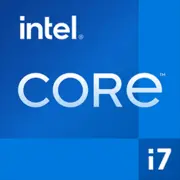Intel Core i7-2960XM

Intel Core i7-2960XM: A Retrospective of Sandy Bridge Mobile Processor in 2025
(April 2025)
Introduction: Why Remember a 14-Year-Old Processor?
The Intel Core i7-2960XM is the flagship processor from 2011, designed for enthusiasts and professionals. Fourteen years later, it remains a curious artifact from an era when a 32nm manufacturing process felt revolutionary, and 4 cores in a laptop were a luxury. In 2025, devices equipped with this CPU are only found on the secondary market (priced around $200–300 for used models), but studying them aids in understanding the evolution of mobile technologies. Let’s explore its relevance today and who it might benefit.
1. Sandy Bridge Architecture: The Foundation of Modernity
Cores, Threads, and Frequencies
- 4 Cores / 8 Threads: Hyper-Threading allowed efficient task distribution, which was revolutionary for laptops in 2011.
- Base Clock: 2.7 GHz, Turbo Boost up to 3.7 GHz (single core) or 3.5 GHz (all cores).
- Cache: 8 MB L3 - provided fast data access for its time.
Integrated Graphics Intel HD 3000
- 12 execution units, clocked up to 1300 MHz.
- Supports DirectX 10.1, OpenGL 3.1 - sufficient for basic graphics but not for modern gaming.
- Examples: Running Minecraft (30–40 FPS on low settings), photo editing in Lightroom 5.
32 nm: The Technology of 2011
- Compared to the 45nm of the previous generation, 32nm reduced power consumption and increased transistor density.
- However, modern 5nm processors (Apple M3, AMD Zen 5) are 4-6 times more energy-efficient.
2. TDP 55 W: The Cost of Power
- High Thermal Output: With a TDP of 55 W, massive cooling systems were necessary. In comparison, modern Intel Core i7-1460P (28 W) provides double the performance with less heat.
- Throttling Issues: In compact laptops (e.g., Dell Precision M6600), the CPU often lowered frequencies under load due to overheating.
- 2025 Recommendation: When purchasing a used device, check the condition of thermal paste and fans.
3. Performance in 2025: Where Is Power Sufficient?
Geekbench 6: Numbers and Reality
- Single-Core: 551 → equivalent to Snapdragon 8 Gen 1 (2022).
- Multi-Core: 1640 → close to Intel Core i5-8250U (2017).
Task Examples:
- Office Work: Google Docs, Excel with tables up to 10,000 rows - smooth operation, but slowdowns when running Zoom and Chrome simultaneously (10+ tabs).
- Multimedia: Converting 1080p video in HandBrake - 15–20 minutes (compared to 3–5 minutes with Apple M1).
- Gaming: Skyrim (2011) - 40–50 FPS on medium settings; CS:GO - 30–40 FPS (720p).
Turbo Boost: A Brief Surge
- Under ideal conditions (cold laptop, plugged in), the frequency rises to 3.7 GHz, but throttling begins after 2-3 minutes.
4. Use Cases: Who Can Benefit in 2025?
- Retro Tech Enthusiasts: For running older games and software that struggle on modern OSes.
- Budget Users: If you need a laptop for web browsing and word processing for $200–300.
- Repair Specialists: As a test bench for hardware diagnostics.
Important: Not recommended for AI work, 4K video, or modern gaming.
5. Battery Life: The Weak Point of Sandy Bridge
- Typical Run Time: 2-3 hours under active use (compared to 8-12 hours for laptops with Apple M2).
- Power-Saving Technologies:
- Intel SpeedStep: Dynamic frequency adjustment.
- C-states: Disabling unused cores.
- Tip: Replacing the old battery with a new one (if you can find a compatible one) could extend battery life to 4 hours.
6. Comparison with Competitors: Then and Now
2011–2013
- AMD A8-3530MX: 4 cores, Radeon HD 6620G. Better graphics, but weaker in single-threaded tasks.
- Intel Core i7-2860QM: TDP 45 W, lower frequency (2.5 GHz), but more popular due to a balance of price and performance.
2025: Modern Analogues
- Apple M2 (8-core): 3-4 times faster in multi-threaded tasks, TDP 20 W.
- AMD Ryzen 5 7640U: 6 cores Zen 4, RDNA 3 graphics - ideal for thin ultrabooks.
7. Pros and Cons in 2025
Strengths:
- Low price for used devices.
- Easy upgrade: Replacing HDD with SSD and adding RAM up to 32 GB (DDR3).
- Compatibility with Windows 10/11 (with limitations).
Weaknesses:
- No support for AVX2, Vulkan, USB 3.2.
- High power consumption.
- Risk of purchasing a device with a worn-out battery.
8. Recommendations for Choosing a Laptop
- Type of Device: Workstation from 2011-2013 (e.g., HP EliteBook 8760w). Avoid ultrabooks as their cooling systems will not handle 55 W TDP.
- What to Look For:
- Presence of SSD (mandatory!).
- Maximum RAM capacity (supports up to 32 GB DDR3-1600).
- Battery condition (better to replace it immediately).
9. Conclusion: Nostalgia or Rational Choice?
The Intel Core i7-2960XM in 2025 is an option for:
- Very tight budgets: If you need a PC for basic tasks.
- Enthusiasts: Builders of retro systems or those who enjoy modifying old devices.
Key Benefits:
- Cost below $300.
- Ease of upgrades.
- Nostalgic experience of using hardware from the 2010s.
However, for most users, it is wiser to choose a modern budget laptop (e.g., Acer Aspire 5 with Ryzen 5 7530U, $500–600), which would provide 4-5 times the performance and 10 hours of battery life.
Conclusion: Sandy Bridge is an important milestone in processor history, but in 2025, the Core i7-2960XM should be viewed only as a historical artifact or a temporary solution. Technology has advanced significantly, and even budget newcomers surpass it in all parameters.
Basic
CPU Specifications
Memory Specifications
GPU Specifications
Benchmarks
Compared to Other CPU
Share in social media
Or Link To Us
<a href="https://cputronic.com/en/cpu/intel-core-i7-2960xm" target="_blank">Intel Core i7-2960XM</a>